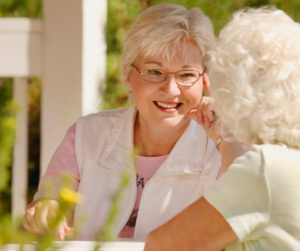5 Signs Your Mom Might Be Socially Isolated at Home
 There are a lot of good reasons for seniors to stay in their own homes as they get older. Better health, being surrounded by memories, and living in a place where they feel safe are some of the reasons why seniors choose to age in place.
There are a lot of good reasons for seniors to stay in their own homes as they get older. Better health, being surrounded by memories, and living in a place where they feel safe are some of the reasons why seniors choose to age in place.
But there are some things that seniors do need to watch out for if they are aging in place, like becoming isolated. If your mom has mobility challenges and finds it tough to get out of the house she may be lonely at home. Or, if she has a health condition that makes social outings difficult or impossible she could be struggling with social isolation.
There are things that seniors can do to prevent social isolation. Companion care at home is a fantastic way for seniors to get the regular social interaction they need for good health. Seniors who have companion care at home get regular visits from a companion.
If you see your mom displaying any of these signs of social isolation, you should talk to your mom about companion care at home:
Decreased Communication
If your senior mom becomes less communicative or withdrawn, especially with family and friends she used to interact with regularly, it could be a sign of social isolation. Pay attention to changes in her willingness or ability to engage in conversations or social activities. Try calling often and see if she engages with you on the phone.
Lack of Interest in Hobbies or Activities
If your mom doesn’t seem interested in doing hobbies that she used to enjoy, or if she doesn’t want to try new activities and prefers to do nothing instead, that could indicate that she’s isolated or lonely. Try to get her interested in taking a class, learning a new hobby, or playing games that will keep her socially engaged.
Physical Symptoms of Loneliness
Pay attention to physical symptoms that may indicate loneliness or social isolation, such as changes in appetite, sleep disturbances, fatigue, or unexplained aches and pains. These symptoms can be manifestations of emotional distress resulting from social isolation.
They can also be side effects of medication, or symptoms of an illness. Anytime your mom is displaying symptoms that are new to her or if her symptoms get worse call her doctor.
Depressive Symptoms
Social isolation can contribute to feelings of depression and sadness in seniors. Look for signs of depression such as persistent sadness, tearfulness, hopelessness, changes in appetite or weight, loss of interest in previously enjoyed activities, or thoughts of self-harm. If your mom seems unusually sensitive or withdrawn those can also be signs of depression.
Increase Anxiety
Social isolation can negatively impact mental and emotional well-being, leading to increased anxiety, stress, and feelings of worthlessness or inadequacy. Notice if your senior mom’s mood or outlook on life has changed and if she expresses feelings of loneliness, boredom, or sadness frequently.
If your mom starts having panic attacks or unusual bouts of anxiety she may need to see a doctor or a psychologist for medication that can help control the physical symptoms of anxiety.
If you or an aging loved one are considering Companion Care at Home in Houston, TX, contact the caring staff at Personal Caregiving Services at 832-564-0338. Providing Care in Houston, Bellaire, West University Place, Katy, Sugar Land, and the surrounding areas.
- The Most Recommended Activities For Seniors Aging In Place - April 21, 2025
- Why Maintaining Flexibility Is So Important For Seniors - April 3, 2025
- Home Care Assistance Helps Seniors Manage Medical Appointments - March 19, 2025
